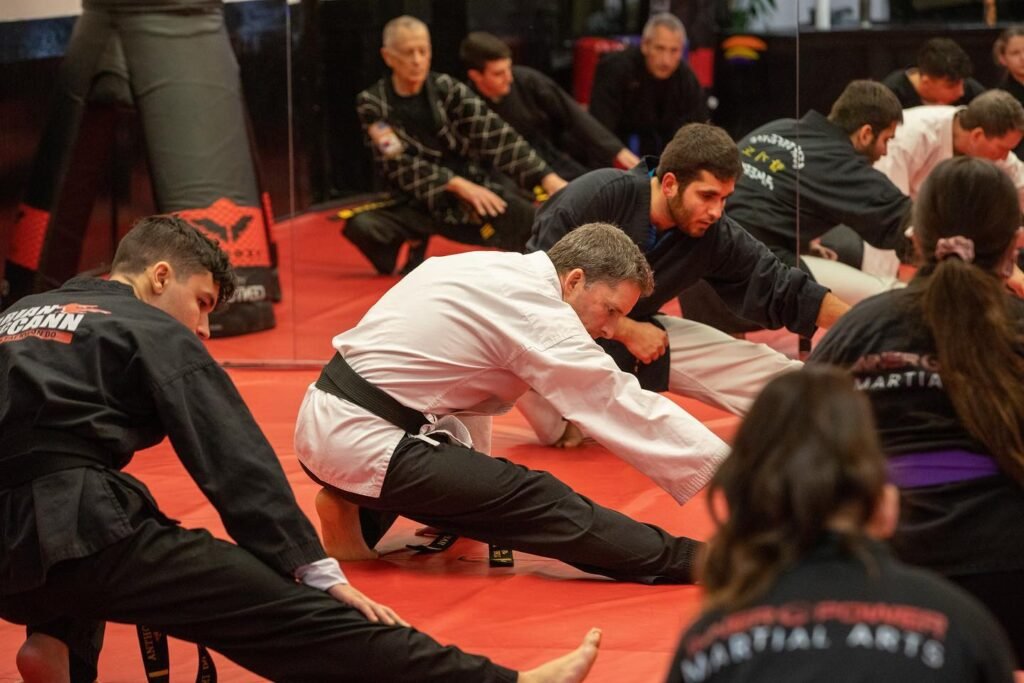
Martial arts is a great way to improve physical and mental skills and is suitable for all ages. If you’ve got kids, or if you’re a teen or an adult, martial arts training can improve fitness, focus and self discipline. But like any physical activity, we need to consider health and safety when starting out.
When you’re ready to start this journey Inner Power Martial Arts has classes for everyone so you can train martial arts safely and enjoyably.
Physical Readiness for Martial Arts Training
Starting martial arts training is an adventure that can improve physical and mental well being. But physical readiness is important to make sure it’s a safe and enjoyable experience.
Individual Fitness Levels
Before you start martial arts classes it’s important to assess your own or your child’s fitness level. This self assessment helps tailor the martial arts experience to your needs whether you’re a beginner or an athlete. Both traditional Chinese martial arts and mixed martial arts have adaptations for all fitness levels so it’s accessible to everyone.
Starting at any fitness level has its benefits as martial arts builds strength, coordination and flexibility over time. By knowing your current fitness level you can prevent martial arts injuries and get the most out of your training.
Age-Specific Considerations
Children: Children have specific physical development needs such as improving balance and coordination. Introducing martial arts gradually helps them adapt safely especially to high impact moves. The focus should be on developing fundamental skills which will lay the foundation for more advanced techniques as they grow. Check out the kid’s programs available at Inner Power Martial Arts >
Teens and Adults: Teenagers go through significant physical changes such as increased flexibility, muscle growth and stamina. Martial arts classes can improve these attributes overall fitness. For adults considerations such as flexibility, joint health and cardiovascular readiness are important. Martial arts can be adapted to accommodate these factors so you can train without accidents or injuries and see significant benefits. Explore our program for teenagers and adults >
Pre-Training Health Assessments
If you’ve been inactive or have specific health concerns it’s recommended to have a physical assessment before starting martial arts. Consult with your family doctor or pediatrician to get an idea of your readiness especially if you have existing health conditions such as heart issues, asthma or joint problems. This will help determine how to start safely and helps tailor the training to prevent injuries so you can enjoy the martial arts journey.
Talk to Your Instructors
Openly discussing any pre-existing medical conditions or injuries with your martial arts instructors is important. At Inner Power Martial Arts we tailor make training plans to suit individual medical conditions. This personalized approach not only enhances your training experience but prioritizes your safety. Instructors play a big role by offering modifications to techniques that may exacerbate medical conditions. Whether you’re training for self defense or fitness, clear communication is a major key to success.
Medical Conditions to Disclose
Asthma: If you have asthma inform your instructors so they can manage the physical intensity of the classes. They can recognize and respond to breathing difficulties and ensure your experience is positive and safe.
Joint or Musculoskeletal Issues: If you have joint or musculoskeletal issues disclose this to avoid putting unnecessary stress on areas like the knees, hips or lower back. Instructors can modify techniques to be gentler and minimize the risk of injury.
Cardiovascular Conditions: For those with cardiovascular conditions adjustments to the intensity and duration of exercises are important. Most martial arts can be modified to suit your heart health needs so you can get the benefits of training without overexertion.

Precautions for Safe Martial Arts Training
Training in martial arts has physical and mental benefits but safety during training is key. Here are some precautions to remember for a safe and enjoyable experience.
Warm-Up and Stretching
Proper warm-up is important to reduce the risk of injury. Dynamic stretching and light cardio prepares your body for physical activity and improves flexibility and blood flow. Common martial arts warm-up routines include jumping jacks, leg swings and shoulder rotations. John’s Hopkins tells us that “Improper warm-up or stretching practices before a sporting event or exercise” is a major cause of sports related injuries. Whether you’re training hapkido, kung fu or other martial arts, a thorough warm-up is the foundation of injury prevention and optimal performance.
Gradual Progression
One of the most important aspects of martial arts training is gradual progression. Beginners and those who have been inactive for a long time should resist the urge to overtrain. The structured nature of martial arts allows for steady progress and prevents overtraining and injuries. A consistent and safe approach is more beneficial in the long run than pushing too hard too soon. Learning proper technique at a slow pace means is how you train the right way.
Hydration and Nutrition
Hydration is a key factor in preventing cramps, fatigue and heat related illnesses during martial arts training. Drinking enough water keeps your muscles functioning at their best and reduces the risk of dehydration related injuries by up to 45% according to the American Council on Exercise. A balanced diet supports your physical training goals and provides the energy and nutrients you need. In martial arts where physical contact and high intensity activity is common, staying hydrated and well nourished is essential for performance and overall health.
Safe Training Environment
A safe training environment is another important factor in preventing injuries during martial arts training. Training should be done in padded, well lit spaces with clear visibility and secure footing. Proper supervision by qualified instructors is important to ensure that safety protocols are followed at all times.
Instructors play a big role in maintaining a structured class and enforcing safety rules to make sure students practice techniques correctly and use protective gear properly. By creating a safe and controlled environment, the risk of accidents and injuries is minimized and students can focus on improving.
Safe Martial Arts Training Practices
Incorporating safety in martial arts training not only promotes physical health but also a respectful and enjoyable learning environment. By communicating any medical conditions, doing proper warm up and hydration, using proper protective gear, individuals can minimize the risk of injury. Furthermore gradual progression and a safe training environment helps to sustain long term participation and growth in martial arts. As you continue your journey these safety principles will make martial arts an empowering and rewarding experience for everyone.








